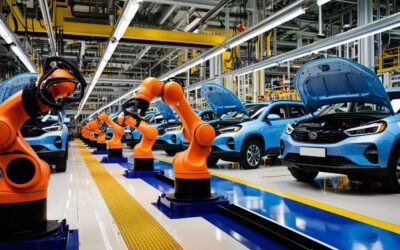Used vehicle prices rise sharply due to the semiconductor supply crisis

Used vehicle prices in the UK rose by 28% in 2021, the highest of any other country in Europe.
The news comes as the global semiconductor crisis has meant that there is a worldwide shortage of new vehicles, meaning that more and more people turn their attention to the second-hand market.
And, as a result, demand has outstripped supply throughout the last 12 months.
The semiconductor crisis
The semiconductor shortage is a global issue, with Ford first highlighting the issue in early 2021, stating that it was a potentially significant issue for the foreseeable future.
The impact of the computer chip crisis is being felt by every car and van maker, which is also affecting other sectors…
And with significant pressure being placed on the automotive sector to achieve tougher emissions targets, priorities have turned to lower-emitting vehicles such as electric vehicle models.
Fleet owners, as well as the leasing and rental industry, have also been warned by manufacturers that the computer chip shortage could extend into the back end of 2022.
The impact on fleets
The knock-on effect of the delays means that more and more light commercial vehicles are entering the fifth and sixth years of their lifespan.
With more miles on the clock and natural wear and tear on parts, mechanical breakdowns become more likely – which is what we’re witnessing.
It’s common for commercial vehicles to hit the 100,000-mile mark, but fleet owners are reporting figures well beyond that. This is causing mechanical failures you wouldn’t ordinarily expect and resulting in unexpected costs for repairs.
Gearboxes are the most severely impacted vehicle part, while the clutch and cambelt are having to be replaced where they might not otherwise have had to.
The issue is that these are expensive components to replace, and fleet owners will not have budgeted for this, particularly when they’ve already started the process of replacing vehicles.
As a result, fleets are having to spend significant sums of money on ageing vehicles, even when they know they’ll be replaced within 12 months.
What does 2022 have in store?
Experts in the automotive sector are predicting that many of the same trends we saw in 2021 will continue this year.
For fleet owners, that means finding creative solutions to the vehicle supply issues, as well as giving serious thought to the electric switchover, if that’s not already top of the agenda.
The reality is that the next decade will see significant changes in the way the UK’s vehicles operate, with the majority set to be electric vehicles.
While the volume of electric cars on the second-hand market is still relatively small (because many are still within 2-3 years of production), that figure is only going to grow.
How is the semiconductor shortage impacting your fleet? Are you due to begin your replacement cycle? If so, have you thought about when the right time is to make the switch to Electric Vehicles?










